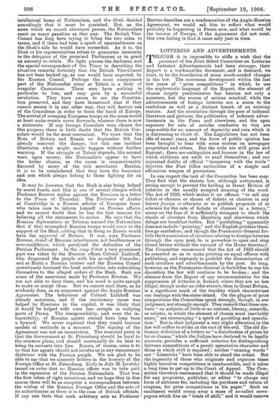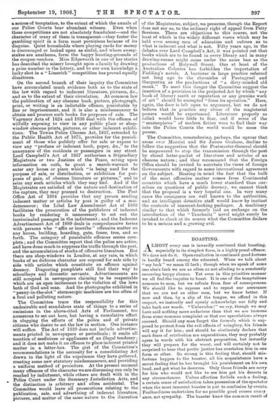LOTTERIES AND ADVERTISEMENTS. T HOUGH it is impossible to stifle a
wish that the personnel of the Joint Select Committee on Lotteries and Indecent Advertisements had been stronger, their Report is a workmanlike document, and is destined, we trust, to be the foundation of some much-needed changes in the law. The enormous development within the last few years of " prize competitions " in which, to use the euphemistic language of the Report, the element of chance largely predominates has become not only a nuisance, but the source of serious mischief, while the advertisements of foreign lotteries are a snare to the credulous as well as a distinct breach of an existing statute. And the circulation through the post of indecent literature and pictures, the publication of indecent adver- tisements in the Press and elsewhere, and the open exposure for sale of articles conducive to vice are responsible for an amount of depravity and ruin which it is distressing to think of. The Legislature has not been idle of recent years, and the force of public opinion has been brought to bear with some success on newspaper proprietors and others. But the evils are still gross and flagrant ; there are ambiguities and lacunae in the law of which evildoers are swift to avail themselves ; and our ingrained dislike of official "tampering with the mails" deprives the Post Office authorities of a simple and efficacious weapon of prevention.
In one respect the task of the Committee has been easy. They find that the statute law, although antiquated, is strong enough to prevent the holding in Great Britain of lotteries in the usually accepted meaning of the word. The Act of 1823, which makes it an offence " to sell any ticket or chances or shares of tickets or chances in any lottery foreign or otherwise or to publish proposals of or schemes for the sale of tickets or chances in a lottery," seems on the face of it sufficiently stringent to check the shoals of circulars from Hamburg and elsewhere which deluge our breakfast-tables. But " publishing " apparently does not include " printing," and the English printers there- fore go scatheless; and though the Postmaster-General for- bids the trausmission of circulars relating to foreign lotteries through the open post, he is powerless to open and stop closed letters without the warrant of the Home Secretary. The Committee recommend that the Act of 1823 should be amended so as to make printing an equal offence with publishing, and expressly to prohibit the dissemination of such circulars and advertisements by the post. So long, however, as the Postmaster-General is forbidden to use his discretion the law will continue to be broken ; and the absence from the Report of any recommendation for the suppression of lotteries in Ireland, where they are no less illegal, though under an older statute, than in Great Britain, is a significant mark of the timidity which characterises our dealings with the sister-island. On the plague of prize competitions the Committee speak strongly, though, in our judgment, not strongly enough. They remark that these con- tests " on subjects of little or no interest, literary, scientific, or artistic, in which the element of chance must inevitably enter," are encouraging " a spirit of gambling and specula- tion." But in their judgment a very slight alteration in the law will suffice to strike at the root of the evil. The old dic- tionary definition of a lottery as " a distribution of prizes by lot or chance," which the Judges have declared to be legally accurate, provides a sufficient criterion for distinguishing between competitions of a purely speculative character and those in which skill is required ; neither " missing words " nor " Limericks " have been able to stand the ordeal. But the ingenuity of those who originate and organise these highly lucrative competitions is inexhaustible, and it takes a long time to get up to the Court of Appeal. The Com- mittee therefore recommend that it should be made illegal for any proprietor, publisher, or editor " to charge any form of entrance fee, including the purchase and return of coupons, for prize competitions iu his paper." Such an enactment would sweep away a mass of so-called news- papers which live on " trials of skill," and it would remove a source of temptation, to the extent of which the annals of our Police Courts bear abundant witness. Even when these competitions are not absolutely fraudulent—and the character of many of them is transparent—they foster the gambling spirit in a form most pernicious because of its disguise. Quiet households where playing cards for money is discouraged or looked upon as sinful, and where sweep- stakes are anathema, form the happy hunting-grounds of the coupon-vendors. Miss Edgeworth in one of her stories has described the misery brought upon a family by drawing a prize number in the lottery, and to our own knowledge a lucky shot in a " Limerick" competition has proved equally disastrous.
On the second branch of their inquiry the Committee have accumulated much evidence both as to the state of the law with regard to indecent literature, pictures, &c., and as to the extent of their circulation. At common law the publication of any obscene book, picture, photograph, print, or writing is an indictable offence, punishable by fine or imprisonment, and it is also a misdemeanour to obtain and procure such books for purposes of sale. The Vagrancy Acts of 1824 and 1838 deal with the offence of wilfully exposing to view in any public place or shop- window obscene prints, pictures, or other indecent exhibi- tions.- The Towns Police Clauses Act, 1847, extended by the Public Health Act of 1875, provides for the punish- ment of those who publicly offer for sale or expose to view any " profane or indecent book, paper, &c.," to the annoyance of the residents or passengers in any street. Lord Campbell's Act of 1857 authorises a Stipendiary Magistrate or two Justices of the Peace, acting upon information on oath, to grant a search-warrant to enter any house or place which " is being used for the purpose of sale, or distribution, or exhibition for pur- poses of gain, of obscene literature or pictures," and to seize any such. articles which they may find. And if the Magistrates are satisfied of the nature and destination of the capture, they may proceed to destruction. The Post Office Act of 1884 provides that any person sending indecent matter or articles by post is guilty of a mis- demeanour; the Libel Law Amendment Act of 1888 facilitates the prosecution of the publishers of indecent books by rendering it unnecessary to set out the incriminated passages in the indictment ; and the Indecent Advertisement Act of 1889 deals in comprehensive terms with persons who " affix or inscribe " offensive matter on any house, building, hoarding, gate, fence, tree, and so forth. The category of punishable offences seems com- plete ; and the Committee report that the police are active, and have done much to suppress the traffic through the post, and the accumulation of stocks of offensive literature. But there are shop-windows in London, at any rate, in which books of no dubious character are exposed for sale side by side with articles which constitute an offence against decency. Disgusting pamphlets still find their way' to schoolboys and domestic servants. Advertisements are still accepted in newspapers claiming to be respectable which are an open incitement to the violation of the laws both of God and man. And the photographs exhibited in "penny-in-the-slot" stereoscopic machines are too often of afoul and polluting nature.
The Committee trace the responsibility for this undesirable and scandalous state of things to a series of omissions in the above-cited Acts of Parliament, too numerous to set out here, but having a cumulative effect in clogging the efforts of the police and of private citizens who desire to set the law in motion. One instance will suffice. The Act of 1889 does not include advertise- ments printed in newspapers or periodicals ; it omits all mention of medicines or appliances of an illegal tendency ; and it does not make it an offence to place indecent printed matter in a letter-box. The gist of the Committee's recommendations is the necessity for a consolidating Act drawn in the light of the experience they have gathered, creating some new statutory misdemeanours, and providing a uniform method of procedure. At the present moment many offences of the character we are discussing can only be reached by indictment, while others are dealt with in the Police Court under the Summary Jurisdiction Acts, and the distinction is arbitrary and often accidental. The Committee would leave all prosecutions relating to the publication, sale, and advertising of indecent literature, pictures, and matter of the same nature to the discretion of the Magistrates, subject, we presume, though the Report does not say so, to the ordinary right of appeal from Petty Sessions. There are objections to this course, not the least of which is the widely different views which may be held even among men of education and culture as to what is indecent and what is not. Fifty years ago, in the debates over Lord Campbell's Act, it was pointed out that books which are to be found in every library and in many drawing-rooms might come under the same ban as the productions of Holvwell Street. One at least of the Australian Colonies has forbidden the importation of Fielding's novels. A barrister in large practice referred not long ago to the chronicles of Pautagruel and Gargantua as the productions of " a dirty-minded old monk." To meet this danger the Committee suggest the insertion of a provision in the projected Act by which " any book of literary merit or reputation or any genuine work of art" should be exempted "from its operation." Here, again, the door is left open to argument, but we do not believe that in practice any abuse of the magisterial powers would be experienced. Literature properly so called would have little to fear, and if some of the " masterpieces " of modern fiction were to find their way into the Police Courts the world would be none the poorer.
The Committee, remembering, perhaps, the uproar that arose over Mazzini and Sir James Graham, decline to follow the suggestion that the Postmaster-General should be empowered to stop the transmission through the post by closed letter-packet of literature and articles of an obscene nature ; and they recommend that the Foreign Office should be invited to ascertain the views of foreign Governments with regard to some international agreement on the subject. Bearing in mind the fact that the bulk of the most offensive matter comes from Continental countries which have a much lower standard than our- selves on questions of public decency, we cannot think that the proposal is a very hopeful one. In very many cases the consignees are well known to the authorities, and an intelligent detective staff would know by instinct the contents of innocent-looking packages. A machinery similar to that which formerly laid an embargo on the introduction of the " Tauchnitz " novel might surely be invoked to check at its source what the Committee declare to be a serious and a growing evil.











































 Previous page
Previous page